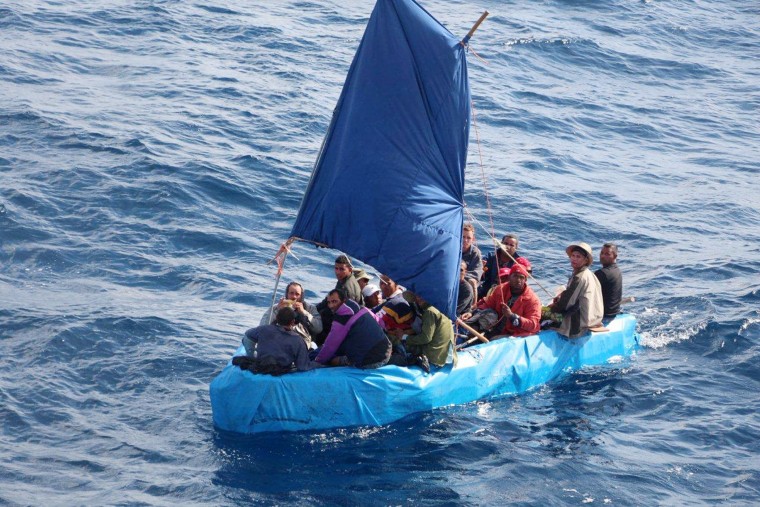A unique immigration policy protecting those who flee Cuba for the United States could soon be in jeopardy.
High-level talks to mend relations between the U.S. and Cuba may only be in their infancy, but already legislators are eyeing ways to roll back the Cuban Adjustment Act, a 1966 law offering safe haven to Cubans who flee from political oppression under the island nation's Communist regime. Under the so-called "wet-foot, dry-foot" policy, Cuban refugees who set foot on American soil are allowed to remain in the U.S. and apply for legal residency after a year and a day. After five years, many are eligible to become U.S. citizens. Those intercepted at sea, however, are instead returned to Cuba.
RELATED: Cuba's Fidel Castro breaks silence
Cuban-American politicians both in Congress and in local governments are now leading the charge to modify the law, saying the program is outdated and highly abused. By design, the law must offer refuge for Cubans to escape political persecution. But critics argue that in reality, many people who travel between the U.S. and Cuba are motivated by economic conditions. However contentious President Obama’s announcement to thaw more than five decades of tensions, hardliners say normalizing relations now provides an opening to change the immigration laws currently on the books.
PHOTOS: Cuba’s emerging LGBT nightlife comes into focus
Commissioners in Miami-Dade County in Florida voted unanimously last month to ask Congress to ditch elements of the unique perks afforded to Cubans and ensure that individuals did in fact face political persecution in Cuba before they are allowed to remain in the U.S..
The legislation’s sponsor, Commissioner Bruno Barriero, said he has had concerns with the Cuban Adjustment Act for years. “Times have changed,” he said. “While the law has benefited individuals, in the big picture, it has also benefited the regime for no longer having to deal with this discontent of the citizens.”
RELATED: 'Deep disagreements' emerge in first round of US-Cuba talks
Barriero’s efforts may find legislators in Washington on his side. Influential Cuban-American on Capitol Hill – from Sens. Marco Rubio, R-Florida, and Bob Menendez, D-New Jersey, to Florida Republican Reps. Carlos Curbelo and Ileana Ros-Lehtinen – have indicated a desire to revamp how the U.S. accepts Cuban migrants. According to The New York Times, Curbelo intends to draft legislation to limit the scope of the existing law to no longer include individuals who come to the U.S. for economic reasons. And on Tuesday, Rubio, a long critic of the Cuban Adjustment Act who just took over as the chairman of the Senate Foreign Relations subcommittee on the Western Hemisphere, is slated to hold a hearing to examine how the Obama administration’s policy changes will impact human rights in Cuba.
Shortly after the president’s announcement, the Coast Guard reported a swift spike in the number of Cuban migrants caught in makeshift boats and rafts along the Florida Straits. In December, 481 Cuban migrants were either intercepted at sea or on U.S. soil, the 7th Coast Guard District out of Miami, Florida, reported. It was a 117% increase from the previous year.
“We did see an increase in Cuban migration. That’s expected when there’s an announcement that affects foreign policy in Cuba and even Haiti,” Chief Petty Officer Ryan Doss said. “We were anticipating and waiting for that.” Doss said the rate of migration flowing from Cuba has since stabilized. Last month, the Coast Guard has intercepted 349 Cuban migrants, still a 69% increase from the year before.
Meanwhile the U.S. Customs and Border Protection is still gathering statistics on the number of Cubans intercepted at border stops in January. But the agency also saw a jump in the number of Cuban migrants caught crossing the southwestern U.S. border. In the last three months of 2014, Border Patrol processed 6,489 Cubans who crossed through Mexico, up from 4,328 the previous year. In Miami alone, the Border Patrol field office reported 2,135 Cuban migrants from October to December.
RELATED: Follow Andrea Mitchell on the ground in Cuba
The Obama administration has stressed that it does not plan to alter migration policy anytime soon. Analysts believe reasons behind the surge of Cuban arrivals in the U.S. is likely two-pronged: As the Coast Guard was anticipating, any major foreign policy announcement is likely to trigger migration of a community fearful that changes could close the door to an exceptionally broad immigration policy for Cubans. Other reasons may simply boil down to misinformation.
Jorge Duany, director of the Cuban Research Institute at Florida International University, said false rumors quickly spread by word of mouth throughout Cuba, suggesting that the benefits would run dry by mid-January. “Many people in Cuba were afraid that they would not be admitted into the U.S.,” he said.
